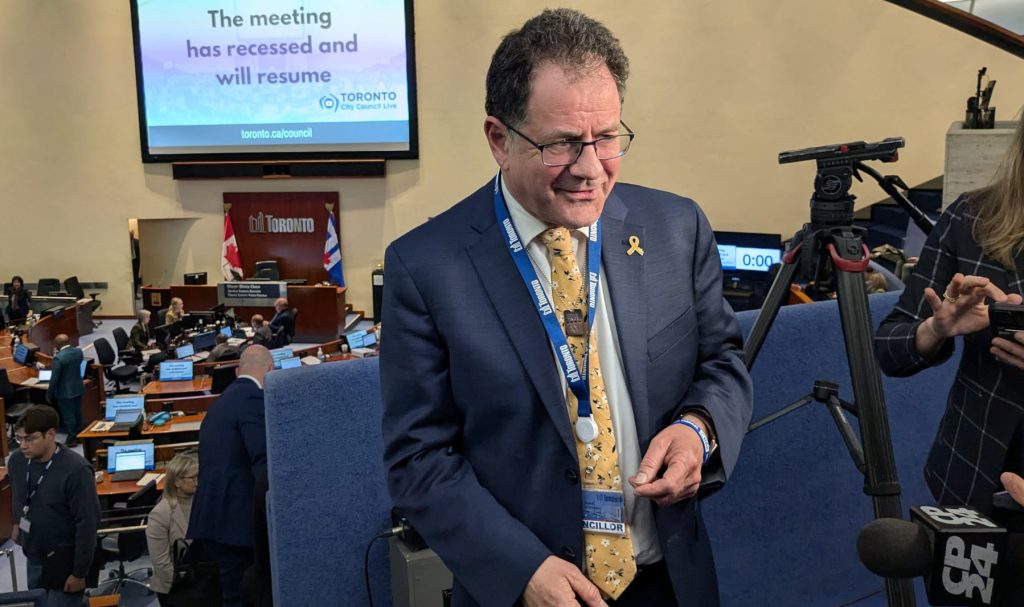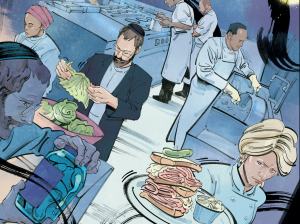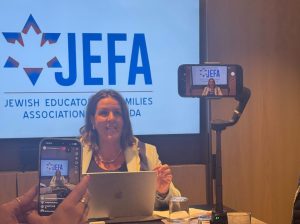On its fourth go-around at Toronto city council since October 2023, the so-called “bubble zone” bylaw that restricts protests passed with amendments, after a full day of debate on May 22.
The bylaw establishes a protest-free buffer zone of 50 metres around childcare centres, houses of worship and community centres—less than the 100 metres in neighbouring Vaughan, Ont., and more than the 20 metres recommended by city staff.
The final vote passed 16-9, with Mayor Olivia Chow supporting the bylaw. The bylaw is set to take force July 2.
In addition, council voted to scrap the requirement that institutions applying for the safe access zone would need to attest to protest-related activity impacting access in the previous 90 days.
Applications are still required for the bubble zones, and council amendments added Thursday extended the period from 180 days to one year once the safe access zone is established. Councillors also voted down a broader zone that would apply to up to 3,000 total facilities in Toronto, according to city staff, including all schools, hospitals, daycares and community centres in the city.
Bylaw officers can ticket offenders who ignore the buffer zone, with fines of up to $5,000.
The subject of much debate inside and outside council for months since the Israel-Hamas war began, spurring unprecedented numbers of large demonstrations in the city, the bylaw’s critics say the restriction on protests infringes on demonstrators’ Charter-protected free speech and assembly rights.
However, large swaths of the city’s Jewish community have called for the bylaw to be passed after months of protests, including some that take place in predominantly Jewish neighbourhoods or target Jewish businesses.
Consistently spiking levels of antisemitism in the city since the Oct. 7, 2023, Hamas attacks on Israel and the subsequent war, have seen multiple attacks on Jewish buildings, and protests outside Jewish businesses and events. Protests have also impacted community centres and daycares such as the downtown Miles Nadal JCC, including at least one case where parents were called to pick up children early due to a protest outside the building.
Some protests outside synagogues, though, in Thornhill, Ont., just north of the city, have occurred when Israeli real estate fairs were held inside the shuls.
While some of the hate crimes impacting Toronto’s Jews aren’t covered by the bylaw—such as disturbing graffiti and vandalism and the multiple gunfire incidents overnight at the Bais Chaya Mushka Jewish girls’ school in North York—supporters say it’s long past time for the city to do something.
Councillor James Pasternak of York Centre, who pushed for 19 months for the bylaw, says the result of the vote shows Torontonians that the city recognizes equal application of Charter rights.
“It [passing the bylaw] sends a strong signal from this council that Charter rights are for everybody, that people should be allowed to enter their institutions, their place of worship, their faith-based schools, kindergartens and so forth, without harassment, and without… space being blocked.”
While he’s relieved the bylaw passed, Pasternak says it took a lot of negotiation among members of council to finally get it done.
“There was a lot of compromise. It is not perfect. There are things in there that I would have preferred to be tougher,” he told reporters following the vote. “But what it was, was a fairly collaborative effort to have a package that the majority of councillors could support.”
The big question now, according to Pasternak, is how police and bylaw enforcement staff will work together to enforce the bylaw. Officers under Toronto’s municipal licensing division would be the ones tasked with warning and potentially ticketing demonstrators in violation of the bylaw, however council included the requirement for Toronto Police Services and the bylaw enforcement team to collaborate.
“They have to work together, because what police say is ‘we are not enforcing bylaws’ and what municipal licensing says is ‘well, we’re not walking into a mob.’ So, what has to happen is municipal bylaw officers have to be escorted by police to lay charges,” said Pasternak.
“Municipal licensing lays the charges if there’s violations, but police have to provide a safe corridor in order to get in there,” he told reporters. “They’re going to have to try and see how this works.”

Supporters of the bylaw point to the city staff’s extensive consultations and coordination with the city’s legal team in drafting the bylaw to be Charter-compliant.
City solicitor Wendy Walberg told councillors that the bylaw proposed in Toronto does not go as far as some of the ones studied from other cities. In addition, Walberg pointed out that only the primary purpose activities of, say, a synagogue or daycare, are covered by the safe access zone provisions when an institution applies to the city for a “bubble zone.”
Significant numbers of protesters attended council dressed in red in a coordinated visible show of opposition to the bylaw. A few surreptitiously either made a gesture or showed a message on a phone or laptop screen behind councillors who were speaking on-camera during the livestreamed meeting. One protester showed the upside-down triangle symbol that protesters say is “resistance” and Jews read as support for Hamas behind Councillor Lily Cheng while she spoke and later another showed a screen reading “Free Gaza” while Councillor Mike Colle spoke. Security guards would then stand in front of the disruptors to block messages from being viewed.

At one point, councillors Brad Bradford and Stephen Holyday extended a 20-metre measuring tape in the chamber, to illustrate the actual proximity of the original proposed distance of 20 metres.
Councillors who voted against the bylaw included Josh Matlow and Alejandra Bravo.
Matlow said that despite his support for the Jewish community, he would not vote for “performative” measures, noting that a bubble zone wouldn’t have stopped incidents such as the shootings at the Bais Chaya Mushka school, among other examples.
Bravo called free speech “crucial.”
“When we stop listening to each other, we polarize. We dehumanize. That’s how we’re going to get through this is to listen to each other,” Bravo said. “I have nothing but empathy and compassion for those people who are feeling very afraid in the city right now in the Jewish community.”
However, she pointed to a different legal approach.
“We have the Criminal Code, we have trespass notices, we have bylaw enforcement … to say that all of these public servants aren’t enforcing this would be incorrect. That’s why we have charges. But what we put at stake is the ability of people to freely speak in a society, which is a fundamental and foundational freedom.”
Later in the day, Councillor Dianne Saxe spoke in support of the bylaw as a measure that respects the Charter while showing a minimum of care about what Jewish Torontonians are experiencing.
“Nothing in this bylaw stops people from protesting,” she said. Saxe, a lawyer, cited the case of a B.C. Supreme Court decision that upheld bubble zones in that province for abortion clinics and the homes of its service providers, which Canada’s top court, she said, effectively upheld by not hearing an appeal to the case. (Ontario has also upheld laws allowing for bubble zones around abortion clinics and service providers’ homes.)
“It is consistent with the Canadian Charter of Rights and Freedoms to have small areas where certain kinds of harassment are not allowed. People can still protest in 99.9 percent of the city, and they do. We have a policy of tolerating large groups of masked people marching through Jewish areas just because it’s a Jewish area. And that’s not legitimate.”
Saxe has previously described at council her apprehension seeing swastikas multiple times with her grandchildren while walking to school and daycare, and a protest that forced kids to be hustled out a back door of the school, in her downtown district.
She said protesting foreign governments are fair game when demonstrations happen outside a country’s embassy or consulate.
“What is not legitimate is to use the excuse of a foreign war that Toronto Jews did not start, do not control, cannot stop … to intimidate toddlers, schoolchildren, people going into a synagogue. And that is what has been happening in this city for the past 18 months.
“My community has never been less safe in Toronto since 1933, when Mayor [William James] Stewart stood up to say we would not tolerate the swastika in Toronto, which was being used to intimidate Jews. And here we are today with more swastikas throughout my ward than has ever occurred since 1933.”
The bubble zone bylaw had been debated, and defeated in May 2024, leading to consultation with Toronto police and the public. (It had last appeared before council in December.)
The public consultation, which preceded the bylaw proposal released ahead of the May 21-23 council meeting, showed deep polarization on whether the bylaw was necessary or if existing laws were simply better enforced.
Organizations opposing the bylaw included the Canadian Civil Liberties Association (CCLA) and Centre for Free Expression (CFE) based at Toronto Metropolitan University.
“Our position remains that this bylaw represents a significant risk to peaceful expression and assembly, and on balance is not necessary in light of the already-existing police powers,” read the CCLA-CFE joint statement in part.
Advocates for the bylaw included a submission from B’nai Brith Canada.
Such bylaws have passed or are being considered in several other Canadian cities, some of them in the immediate Toronto vicinity, like Vaughan and Brampton, which passed safe access zone bylaws in 2024. Brampton’s “nuisance demonstration” bylaw, passed in November, came after demonstrations outside a Hindu temple turned violent.
In Oakville, town council earlier in May unanimously passed the “Safe Access to Places of Worship Bylaw” restricting “specified protest activity” within 50 metres of any place of worship while services are taking place.
Mississauga City Council is due to discuss a similar bylaw in June. Hamilton, Ont. is also drafting a bylaw.
Ottawa is considering two bylaws, one to establish bubble zones, and another to do away with permits for demonstrations. Late in 2024, a demonstration at the Solway JCC in Ottawa targeted a Jewish seniors’ home over a recruitment event by Sar-El, which organizes volunteers who help Israel’s military, being held at the facility.
Calgary’s municipal bylaw is now being tested in a provincial court challenge launched by the Canadian Constitution Foundation, citing a lack of jurisdiction from the city to enact the bylaw, and calling it unreasonable. The same foundation is also attempting to have the case heard by the Supreme Court of Canada, according to a report in The Globe and Mail.
One day before the vote Pasternak held a press conference at city hall with faith leaders including from Jewish, Hindu, and Christian organizations to speak in support of the bylaw.
Reverend Ron Matheson, of the Pentecostal Assemblance of Canada, said that the Toronto he moved to in 1995 has changed.
“Our country is changing, but we can do something about it. We can protect the people within our cities and across the nation, and I think we need to do so. It creates an environment of mutual respect. Any of the religious groups in in this city that I’ve come in contact with, there is mutual respect. They want safety. They want the dignity of a place to worship in a multifaith, multicultural community.”
In a statement following the vote, the Centre for Israel and Jewish Affairs (CIJA) thanked Chow and councillors for taking “a principled stand” to “ensure that children, seniors, and families feel safe walking into their schools, daycares, and places of worship” and called the move a “meaningful step toward protecting Torontonians.”
“When pro-Hamas mobs march through our streets glorifying terrorism and calling for violence against Jews, it causes real harm to communities and puts lives at risk,” read the statement from Josh Landau, CIJA’s Ontario director of government relations.
“There is broad support for safe access zones from diverse religious and ethnocultural leaders who recognize that freedom of expression does not include a right to intimidate, bully, and harass communities,” the statement went on.
Councillor Rachel Chernos-Lin, whose amendments to the bylaw were among those that helped its passage at council, said the result isn’t only a win for the Jewish community.
“A significant number of council voted in favour of this, and you heard them talk, really, with care and thought about how they were voting, and I feel more like we landed in a place where the Jewish community, and really all members, Muslims, everyone can feel like we are looking out for everyone who lives in our city and trying to balance freedom of speech with the right to access our important faith institutions, daycares, schools—all of those pieces,” she said.
“And we’ve done it in a way that is respectful of the Charter, but also, in a way to make people feel like this is a city they want to live in.”
Author

Jonathan Rothman is a reporter for The CJN based in Toronto, covering municipal politics, the arts, and police, security and court stories impacting the Jewish community locally and around Canada. He has worked in online newsrooms at the CBC and Yahoo Canada, and on creative digital teams at the CBC, and The Walrus, where he produced a seven-hour live webcast event. Jonathan has written for Spacing, NOW Toronto (the former weekly), Exclaim!, and The Globe and Mail, and has reported on arts & culture and produced audio stories for CBC Radio.
View all posts








